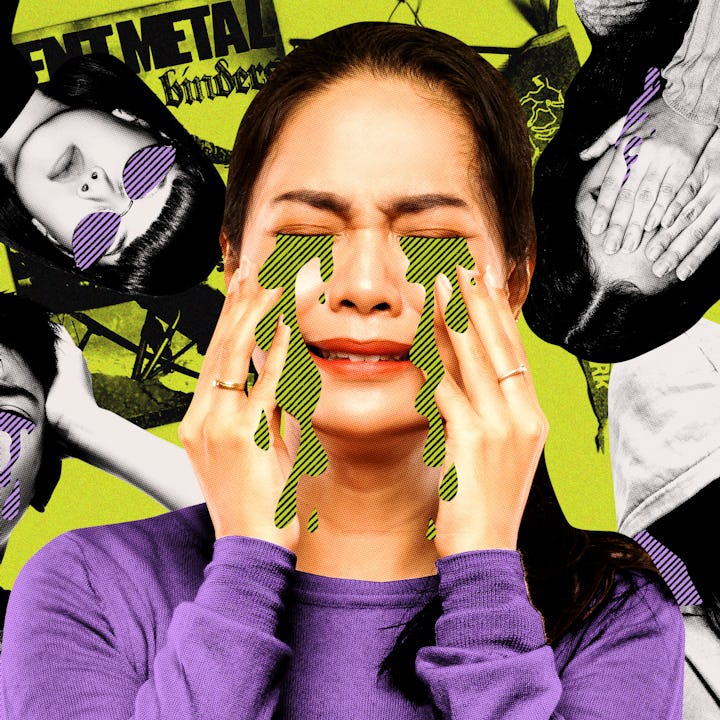I'm Hormonal And Living With Four Very Hormonal Kids — Send Help
What happens when we’re all pissy from hormones? Nothing good, that’s what.

Two days before I get my period, I hate everyone and everything in my house — my husband, my kids, my dog, my dishwasher. A red mist of loathing descends upon my being and I want to bang my fists on the kitchen floor like a 3-year-old. And then, magically, 48 hours later, I love everyone again and guess what? My period arrives. I’ve been menstruating for over 30 years. Why does this still surprise me?
Hormones, my friend. Hormones.
Add to my own periodic (sorry) ire is the reality that I live with four tweens and teens. My kids range in age from 12 to 20, so the hormone situation is out of control. Society tells us that girls are hormonal, moody, and bitchy and boys show no signs of being hormonal. I am here to call bullshit. Boys have mood swings too, they just look and sound different, and sometimes they’re even silent.
Let me explain.
Estrogen and testosterone, the sex hormones that get turned on by the brain during puberty are produced, respectively, by the ovaries and testicles. But they don’t just cause adolescents’ bodies to grow and change — they also circulate in the brain, creating a kind of hormone stew that affects moods, behavior, and decision-making.
The middle schooler’s hysterical laughing which turns to hysterical crying in a hot second is the result of estrogen circulating in the brain. The high schooler’s explosive anger to a seemingly benign question like: Do you have any homework? is the result of brains swimming in estrogen or testosterone. The decade-long impenetrable silence that sits across us at the dinner table is, you guessed it, the result of hormones.
The point is, when hormones are swinging like Tarzan on the vine, people can’t always help their less-than-ideal reactions to things. I am guilty of this even though I’ve had decades to learn my moods and create some semblance of order with them. So how about the kids for whom this entire experience is novel and scary? They have zero practice at this. It’s all new and super confusing.
So what happens when my irrational anger coincides with my kid’s hormonal eruptions? Nothing good. It is the perfect storm of dysregulated emotions, volatile personalities, and high stress. Is there a good term for “parallel play” except when everyone is pissed off and out of control? Because this would be that. Maybe a “parallel sh*tstorm”?
However, we don’t just chalk it all up to hormones and capitulate. Kids need us to help calm them when they start crying out of the blue or become furious for seemingly no reason. Feeling out of control is frightening to young people, and adults have the important and difficult job of bringing the temperature down, even when we ourselves are also at a fever pitch (menopause pun intended).
So here are my best reminders for managing the chaos when everyone in my house is moody and things are spinning out:
I always get a do-over. When I screw up, which I 100% will do, I take solace in remembering that I always get to try it again. Hey kiddo, when I screamed at you earlier for spilling your water, I really blew it and my reaction was unfair. I’m really sorry. Not only does that right a wrong I have committed, it also models for my kids a path forward after messing up.
Kids (and adults) can’t always help it. I like to remind myself that when hormones are in the driver seat, people can’t always control the car. Remembering that it’s not necessarily a choice to be explosive or sullen, but a downstream effect of body chemistry, helps me take a more generous look at what’s going on with my kids.
Hormones are not a free pass. Recognizing that human beings can’t necessarily control their moods does not mean permitting any and all behavior in the name of hormones. What it does mean is recognizing that people are not their best selves in that moment (screaming, shouting, mulish) and their behavior should be addressed when cooler heads prevail. Cruel, unkind, and disrespectful behavior never gets a free pass but it doesn’t have to be dealt with that very second.
Teach kids to pay attention to their bodies. When sex hormones first start rampaging around bodies, it can feel like the whole world has been turned upside down and inside out. But over time, it’s great to learn our rhythms and figure out what we need in response. Becoming more connected to the ways our emotional reactions are tied to our physical reality is never a bad thing.
There is a last ditch solution when all else fails: Get some chocolate and share it with your kid. It is like fairy dust for the moody mess in all of us.
Vanessa Kroll Bennett is the co-host of The Puberty Podcast; the founder of Dynamo Girl, a company using sports and puberty education to empower kids; and the author of the Uncertain Parenting Newsletter, musings on raising adolescents. You can follow her on Instagram @vanessakrollbennett.